Holiday Safety Tips for Dogs
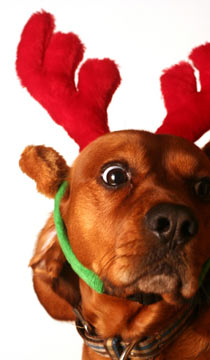
The holidays are a wonderful time of year for most of us. The decorations, food, gifts, and get-togethers all help us to reflect on the previous year and look forward to the next one. If you have dogs, you naturally want to include them in the festivities. Knowing and avoiding the extra holiday-time dangers that face your dog will allow you both to thoroughly enjoy the season. Let's take a tour around a holiday-ready home with Rudolph, the best danger-sniffing dog in the business.
When we enter the beautifully decorated holiday home, the first thing Rudolph heads toward is the Christmas tree. Rudolph is right! The tree is a source of several dangers for dogs trying to get in on the seasonal fun.
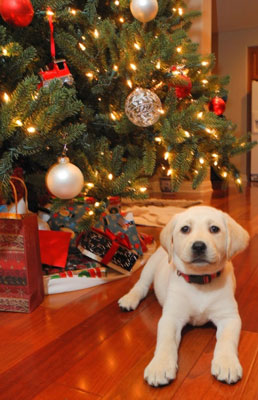
The Christmas Tree
Let's look at the hidden threats that this holiday centerpiece can pose:
- The decorations: Glass bulbs are a source of injury to dogs when they break. Sliced tongues, gums, or paws are painful and messy. Some dogs, especially puppies, can't resist grabbing bulbs, not understanding that they're different from their regular balls. Keep glass bulbs high enough on your tree so your dog can't reach them.
- Bubble lights: These decorations are often filled with methylene chloride, a substance that is highly toxic if inhaled, ingested, or touched—for you and your dog. This is another tree decoration to handle with care and always keep out of your dog's reach.
- Tinsel: This is a beautiful addition to a decorated tree, adding sparkle and whimsy. But, if you have pets, it's best to ditch the tinsel. If it is ingested by your dog, it can become attached to the tongue or stomach and cause an obstruction requiring surgery. This is a very common occurrence with cats but it can happen to dogs too, especially curious puppies.
- The string lights: String lights can be tempting for dogs to mouth and chew on. This can cause painful burns in the mouth and even death from electric shock. They can also get wrapped around dogs' legs, causing a tripping hazard.
- Salt dough ornaments: Many trees in the homes of people with kids or grandkids feature these homemade decorations. They are great for remembering Christmases past but keep them high enough on the tree that your dog can't get to them. Dogs seem to love to eat these and they contain a high amount of salt. This can cause serious electrolyte imbalances and severe illness.
- Tippiness: Make sure your tree is anchored to a wall or other stable object. Otherwise, when your dog is investigating the tree, it may topple over onto him and cause injury. (Plus, it's no fun to wake up to a giant crash in the middle of the night.)
We're done with Christmas tree hazards, Rudolph. Why are you still sitting near it? Oh! You're right: the gifts can also be a source of canine peril.
Gifts
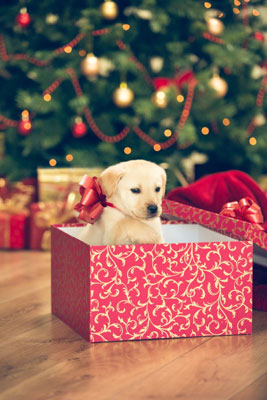
How could wrapped gifts be hazardous to dogs? Let's take a look:
- What's inside?: Wrapped holiday gifts containing food can be sniffed out, opened up, and devoured by your pup before you can say "Santa"! This is a problem if the gift contains chocolate, alcohol, xylitol, grapes or raisins, or anything fatty. It's best to keep gifts containing food put away until the big reveal.
- Ribbons and bows: Dogs may want to play with the ribbons and bows they find on your wrapped packages. These can cause linear foreign bodies, obstructions, or GI irritation if they are eaten.
Rudolph seems to be finished checking out the tree now and is now sniffing his way toward the end table. He's found a lighted candle!
Candles and Potpourri
Candles and similar items are another source of risk for dogs during the holidays or any time.
- Candles: We love to put scented candles around our house during the holidays to help create a cozy, festive atmosphere. But remember to keep them way out of reach of your dog, on something that can't be jostled. Candles are a fire hazard if they are knocked over by exuberant canine play but they can also burn your dog's tongue if he decides to try and taste the source of the yummy smell.
- Potpourri: Dry and liquid potpourri should both be kept in a safe place out of your dog's reach as well. If ingested, either can cause chemical burns to the mouth and GI upset.
Where are you heading now, Rudolph? Ah, the kitchen. One of a dog's favorite places all year but especially during the holidays. Rudolph sure knows his stuff; there are lots of dog menaces lurking here.
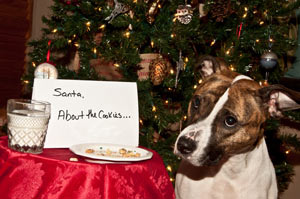
Dog-Dangerous Foods
Many human foods are dangerous for dogs to consume.
- Chocolate contains caffeine, theobromine, and is fatty. All of these things are dangerous for dogs. Chocolate can cause GI upset, pancreatitis, seizures, coma, or even death. There's more of it around during the holidays so be diligent about keeping it out of reach of your dog.
- Fatty foods are also available more abundantly during the holidays. Dogs don't metabolize fats the same way humans do, so they can cause GI upset or even pancreatitis, which can be very serious.
- Bones are not safe for dogs to chew on or eat. They can cause broken teeth, damage to the gums, tongue, or esophagus, choking, GI puncture, or GI obstruction. Make sure you take any ham, turkey, or chicken bones directly to a properly-secured trash can.
- Alcohol is not safe for dogs. It causes the same brain and liver effects as it does on humans but, being smaller than people, irreversible damage to those organs occurs with much smaller amounts. Keep an eye on your cocktails and any fruitcakes or other foods made with alcohol.
- Grapes, raisins, and currants can all cause kidney failure in dogs. Some animals seem to be more resistant to this but, in some, very small amounts can result in kidney failure. Cookies, fruitcakes, fruit salads, and other holiday goodies may be hidden sources of these dangerous items.
- Xylitol is an artificial sweetener that is toxic to dogs. It can cause a dangerously low blood sugar and liver failure. Xylitol can hide in a lot of products so it's best to use caution when allowing your pet to eat any human food.
- Rising yeast doughs are a sneaky source of poisoning in dogs. Once your dog eats it, it can continue to rise in the moist, warm environment of the stomach. It can expand so much that the stomach can stretch enough that its blood supply is compromised. Also, raw dough contains yeast that ferments in the stomach, resulting in alcohol poisoning.
- Salt is a source of toxicity in dogs. It leads to electrolyte imbalances that result in seizures, coma, and death.
Make sure you are diligent about the foods that your dog has access to from you, from your guests, lying around in reachable areas, or in unsecured trash cans. You can learn more about human foods that are dangerous for dogs in the slideshow "Foods Toxic to Dogs."
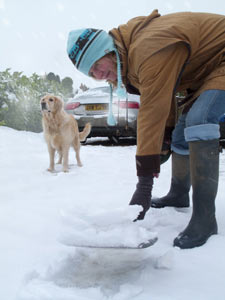
What on earth is Rudolph doing now? What could possibly be dangerous in the guest bedroom, on the bedside table? Oh! Right again, Rudolph! Aunt Maude's medication is within your reach.
Medications
Human medications should always be assumed to be toxic to dogs. This is the case for prescription and over-the-counter drugs. Your guests may not be aware that your dog could get into their medication and be harmed so it's best to mention to them to keep it secured.
It looks like Rudolph may be finished finding holiday hazards in the house: he's heading outside to play. Nope! He's stopped on the porch, next to the bag of de-icer that was put there for easy-access. We don't want guests slipping on the stairs.
De-Icer and Anti-Freeze
There are extra hazards for dogs outside during the winter.
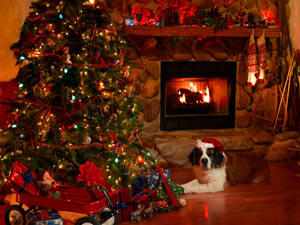
- De-icer is toxic when ingested by dogs. Eating small amounts of de-icing products can cause vomiting and diarrhea. Eating larger amounts can cause your dog to develop an electrolyte imbalance and this can lead to increased thirst, kidney damage, seizures and death.
- Anti-freeze is highly toxic when ingested by dogs. One tablespoon can kill a 10-pound dog. Unfortunately, dogs can actually be drawn to licking up spilled antifreeze; the sweet taste attracts them.
Rudolph, you've done a fine job of sniffing out the extra dangers that threaten dogs in our homes during the holidays. Now that we've made our home safe for Rudolph and his pals, we can all get down to the business of enjoying the season.
You May Also Like These Articles:
Dog Photography: How to Get a Good Picture of Your Dog
Disclaimer: This website is not intended to replace professional consultation, diagnosis, or treatment by a licensed veterinarian. If you require any veterinary related advice, contact your veterinarian promptly. Information at DogHealth.com is exclusively of a general reference nature. Do not disregard veterinary advice or delay treatment as a result of accessing information at this site. Just Answer is an external service not affiliated with DogHealth.com.



